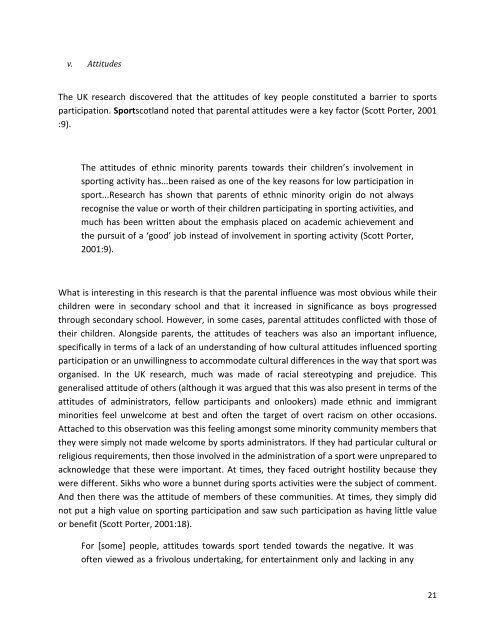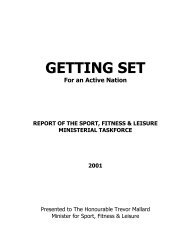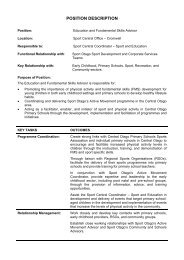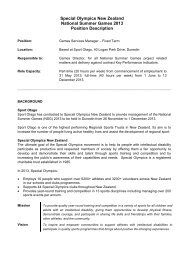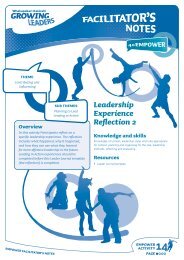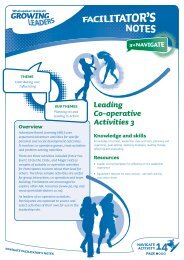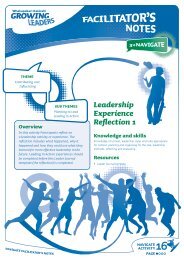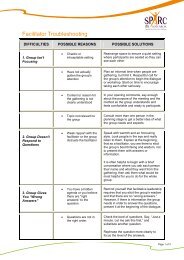sport and cultural diversity - Sport New Zealand
sport and cultural diversity - Sport New Zealand
sport and cultural diversity - Sport New Zealand
Create successful ePaper yourself
Turn your PDF publications into a flip-book with our unique Google optimized e-Paper software.
v. Attitudes<br />
The UK research discovered that the attitudes of key people constituted a barrier to <strong>sport</strong>s<br />
participation. <strong>Sport</strong>scotl<strong>and</strong> noted that parental attitudes were a key factor (Scott Porter, 2001<br />
:9).<br />
The attitudes of ethnic minority parents towards their children’s involvement in<br />
<strong>sport</strong>ing activity has...been raised as one of the key reasons for low participation in<br />
<strong>sport</strong>...Research has shown that parents of ethnic minority origin do not always<br />
recognise the value or worth of their children participating in <strong>sport</strong>ing activities, <strong>and</strong><br />
much has been written about the emphasis placed on academic achievement <strong>and</strong><br />
the pursuit of a ‘good’ job instead of involvement in <strong>sport</strong>ing activity (Scott Porter,<br />
2001:9).<br />
What is interesting in this research is that the parental influence was most obvious while their<br />
children were in secondary school <strong>and</strong> that it increased in significance as boys progressed<br />
through secondary school. However, in some cases, parental attitudes conflicted with those of<br />
their children. Alongside parents, the attitudes of teachers was also an important influence,<br />
specifically in terms of a lack of an underst<strong>and</strong>ing of how <strong>cultural</strong> attitudes influenced <strong>sport</strong>ing<br />
participation or an unwillingness to accommodate <strong>cultural</strong> differences in the way that <strong>sport</strong> was<br />
organised. In the UK research, much was made of racial stereotyping <strong>and</strong> prejudice. This<br />
generalised attitude of others (although it was argued that this was also present in terms of the<br />
attitudes of administrators, fellow participants <strong>and</strong> onlookers) made ethnic <strong>and</strong> immigrant<br />
minorities feel unwelcome at best <strong>and</strong> often the target of overt racism on other occasions.<br />
Attached to this observation was this feeling amongst some minority community members that<br />
they were simply not made welcome by <strong>sport</strong>s administrators. If they had particular <strong>cultural</strong> or<br />
religious requirements, then those involved in the administration of a <strong>sport</strong> were unprepared to<br />
acknowledge that these were important. At times, they faced outright hostility because they<br />
were different. Sikhs who wore a bunnet during <strong>sport</strong>s activities were the subject of comment.<br />
And then there was the attitude of members of these communities. At times, they simply did<br />
not put a high value on <strong>sport</strong>ing participation <strong>and</strong> saw such participation as having little value<br />
or benefit (Scott Porter, 2001:18).<br />
For [some] people, attitudes towards <strong>sport</strong> tended towards the negative. It was<br />
often viewed as a frivolous undertaking, for entertainment only <strong>and</strong> lacking in any<br />
21


